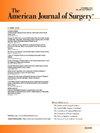Surgical training simulation modalities in minimally invasive surgery: How to achieve evidence-based curricula by translational research
IF 2.7
3区 医学
Q1 SURGERY
引用次数: 0
Abstract
Background
Surgery has evolved from a hands-on discipline where skills were acquired via the “learning by doing” principle to a surgical science with attention to patient safety, health care effectiveness and evidence-based research. A variety of simulation modalities have been developed to meet the need for effective resident training. So far, research regarding surgical training for minimally invasive surgery has been extensive but also heterogenous in grade of evidence.
Methods
A literature search was conducted to summarize current knowledge about simulation training and to guide research towards evidence-based curricula with translational effects. This was conducted using a variety of terms in PubMed for English articles up to October 2024. Results are presented in a structured narrative review.
Results
For virtual reality simulators, there is sound evidence for effective training outcomes. The required instruments for the development of minimally invasive surgery curricula combining different simulation modalities to create a clinical benefit are known and published.
Conclusion
Surgeons are the main creators for minimally invasive surgery training curricula and often follow a hands-on oriented approach that leaves out equally important aspects of assessment, evaluation, and feedback. Further high-quality research that includes available evidence in this field promises to improve patient safety in surgical disciplines.

求助全文
约1分钟内获得全文
求助全文
来源期刊
CiteScore
5.00
自引率
6.70%
发文量
570
审稿时长
56 days
期刊介绍:
The American Journal of Surgery® is a peer-reviewed journal designed for the general surgeon who performs abdominal, cancer, vascular, head and neck, breast, colorectal, and other forms of surgery. AJS is the official journal of 7 major surgical societies* and publishes their official papers as well as independently submitted clinical studies, editorials, reviews, brief reports, correspondence and book reviews.

 求助内容:
求助内容: 应助结果提醒方式:
应助结果提醒方式:


